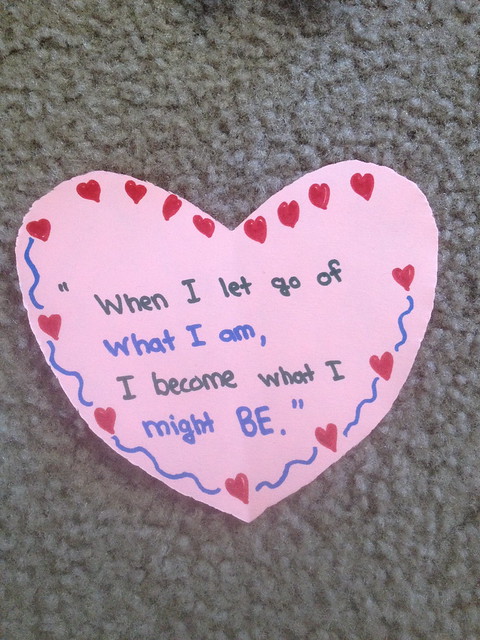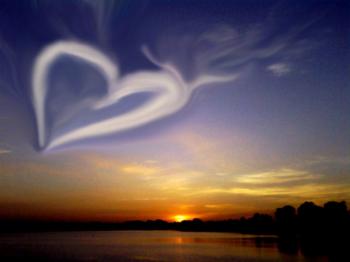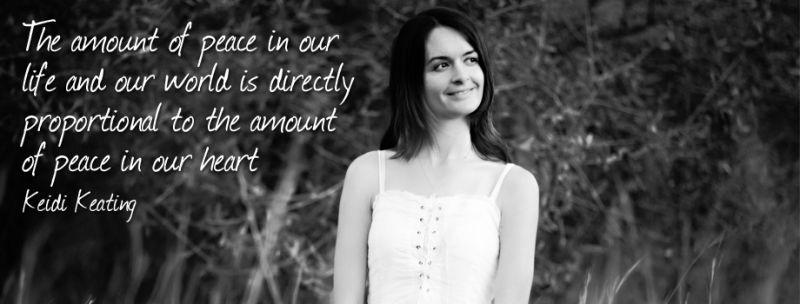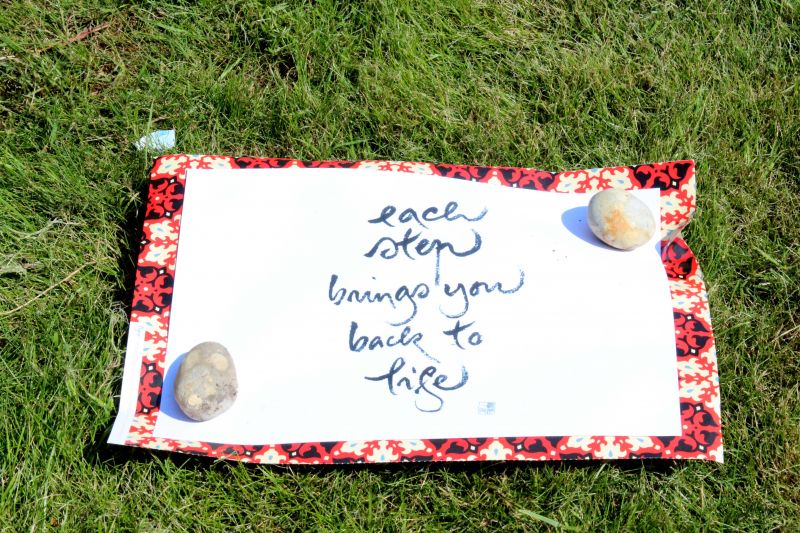Keidi Keating: Re-Awakening Your Inner Spark
“There was definitely something inside me as a child that wanted to help give back,” Keidi tells us, “But that really got lost as I got older. Just with the materialistic elements of life, I suppose you kind of forget who you really are.”
 As she grew into her twenties, Keidi Keating found herself living in Spain, running a successful magazine business, and moving through her days with a creeping sense of misalignment. After a two-year period of intense soul-searching, paralyzing bouts of depression, and a sincere yearning for purpose, she stopped and asked for a sign. So began a journey that would lead her to publish a book, The Light, launch The Light Network, and move her feet in tune to a greater rhythm—one that serves others while transforming herself along the way.
As she grew into her twenties, Keidi Keating found herself living in Spain, running a successful magazine business, and moving through her days with a creeping sense of misalignment. After a two-year period of intense soul-searching, paralyzing bouts of depression, and a sincere yearning for purpose, she stopped and asked for a sign. So began a journey that would lead her to publish a book, The Light, launch The Light Network, and move her feet in tune to a greater rhythm—one that serves others while transforming herself along the way.
Last Saturday, we had the chance to speak with Keidi about her unique experiences. Below are excerpts from the conversation moderated by Bela.
Bela Shah: Can you share a bit about your background? Where you grew up and a bit about your family?
Keidi Keating: I grew up in Southeast London, in a town called Kent, which is known as the garden of England. It’s very green there. I’m actually the youngest of four, so I’ve got like two older brothers and an older sister. And my parents both are lovely people. My mom is a practicing Catholic. My dad was never really into any religion in particular.
BS: Your book, The Light, is focused on helping others find their own inner light, and their own purpose in this world. Did you always have this desire to help others?
KK: When I was very young, my mom used to tell me about families in Ethiopia. How people there were very poor and didn’t have much, materially. At Christmas time, I would start getting concerned about the Ethiopian people. I remember saying to my mom, “What happens to the Ethiopians? Will they get any Christmas presents this year?”
.jpg) She said, “Well, no. They don’t have anything, they’re very poor. They won’t get any presents.”
She said, “Well, no. They don’t have anything, they’re very poor. They won’t get any presents.”
I started feeling really bad for the children there, mainly because as a child, I was excited about all the toys I was going to receive. And I knew that they wouldn’t have that. So I put aside some of my toys, and I gave them to my mom, saying, “These are for the Ethiopian children for Christmas. Can you get them to them?”
My mom just smiled, “Yeah, that’s really nice of you. I’ll make sure that the children get them.”
But at that time, I don’t think there was really that type of service to get those toys to the Ethiopian children. One day when I was twenty or something, my mom hauled out this big black sack. And it had all the toys that I thought was going to the Ethiopian children back then. It was quite funny to see all the things I had put in there.
So really, there was definitely something inside me as a child that wanted to help give back. But that really got lost as I got older. Just with the materialistic elements of life, I suppose you kind of forget who you really are.
BS: I know you went through a pretty profound period of depression in your life as well. Can you describe what brought on that depression, and what you learned in going through that?
KK: That really happened when I was around twenty-seven or twenty-eight, about three or four years ago. I had a magazine in Spain. I had moved from England to Spain at about the age of twenty-three, and I set up a magazine there for the expat community. It was going well—it was a very successful business venture, I suppose. But after a couple years, I realized I didn’t really want to do it anymore. I didn’t really feel like it was my purpose in life.
So I invited my sister over, actually. She was still in England, but she came to Spain and she took over the business. And at that point, I thought, “Ok, I’m going to just have a few months off. I’m not going to do much in these few months, just see what comes into my life.”
But really nothing did. [laughs]
I was really looking for my purpose and nothing was coming up. I tried other businesses and things, but they really weren’t resonating. They just left me feeling more miserable. So this went on for quite a number of months. It went on for about two years, actually, where I was really desperately searching for an answer. And I was getting frustrated, and it did turn into depression.
 There were times where I just curled up on my sofa for literally hours on end, and I would be crying. Just being completely helpless, useless. I didn’t think I was here for any reason. I didn’t know why I was even here—didn’t know the point. I wouldn’t say I was suicidal, because that would be a bit much to say, but I was really questioning the reason for my being here.
There were times where I just curled up on my sofa for literally hours on end, and I would be crying. Just being completely helpless, useless. I didn’t think I was here for any reason. I didn’t know why I was even here—didn’t know the point. I wouldn’t say I was suicidal, because that would be a bit much to say, but I was really questioning the reason for my being here.
That was an intense period of my life, but it was also one where I think I learned a number of lessons as a result of that. I think in order to see the light, we need to go through that dark spell, so we have that contrast. And then we’re able to remember the real reason why we’re here. So actually that did happen for me, but how that happens is different for different people.
BS: Can you talk about the steps you were able to take in order to learn from that period of darkness?
KK: Actually, the first thing that happened was that I kind of surrendered. I kind of got to a place where I just had to accept. And rather than kind of looking and thinking, and being so mental about it— like, "Why am I speaking like this?" and "When is this going to end?"— I just suddenly reached a place of acceptance. But more than that, I asked. And it was that pivotal moment of asking—I was completely present at that moment. I remembered it so vividly, because I was so there. At the same time realizing that now’s the time to ask—that now’s the time I can’t actually go any lower, and I’m ready to move on.
So I did.
I addressed it to anybody that was up there listening. And twenty-four hours later, I picked up this magazine that I never usually pick up, and there was a ad for a “Mind, Body, Spirit” Festival, which was about half-hour drive from my house in Spain. Initially, I thought, “Oh, it’ a bit far to go.” All these things came up about why I maybe shouldn’t or couldn’t go to this festival. But there was also this very big inner knowing that I have to go there. And I didn’t really know why.
While I was there, I met a man who did something called cellular healing. Where he would release negative energy from the body’s cell, which would then free up from the body’s space. After the session, I felt so different. I felt very free. Soon after, it came into my head to put together this book. And this book would basically have all the people in it that had helped me on my journey so far.
BS: There was a voice, a calling, and you followed that. Was it something that you didn’t even have to think about?
 KK: I didn’t think about it too much, although it was a very strong knowing. I suppose we all get that sense sometimes.
KK: I didn’t think about it too much, although it was a very strong knowing. I suppose we all get that sense sometimes.
The only part of the voice that I didn’t really listen to at first was that it said that I had to do this book 100% for charity. All the net profit had to go to a charity, which I could choose.
At the time, I thought, “Well, that’s not very logical. How am I going to live? If I’m doing this book, and I’m spending all my time on it, how am I going to make a living?”
So I tried to sort of change it and do half for charity and keep half just for me to be able to live. But, that did not work out at all. It just wasn’t flowing. Then I heard a voice again, and it said, “No, this has to be 100% for charity. It has to be.”
So I changed it back again to be 100% for charity. That’s when it all started coming together. The mind was trying to come up with this reason about how it was unreasonable for me to do that, and for it to be 100% for charity. But actually all of that just sort of took care of itself in the end. So I didn’t have any need to be worried. I should’ve just listened 100% from the beginning, and I wouldn’t have had any of those issues.
.jpg)
BS: Tell us more about the book. You have luminaries in there like Don Miguel Ruiz and Barbara Max Hubbard. How did you begin to make it happen? You just had this volition, and you just did this act. You reached out to people, and you just asked to make this idea come true. Having gone through this, what do you think keeps people from asking?
KK: I think a lot of why a person might decide not to ask comes down to self-worth. Sometimes people might look at some of these really successful— or what we might deem “successful”— people (who might be best-selling authors or have a name in some way) they might look at them as being somehow superior to them. When I was going through this depression, and even before that, I would’ve fallen into that category of not feeling like I was important enough myself, to ask. But I think when that spark was reawakened in me, I found that not to be the case at all. We’re all equal beings.
BS: Can you share any particularly memorable insights or stories that these contributing authors shared in your book? What parts really moved you?
KK: When it comes to the personal stories of some of the contributors—a dear friend of mine, Julie Chimes, talks about the time when she was almost stabbed to death. She was actually about my age—about thirty-two at the time—and she received multiple stab wounds. But in this moment of being stabbed, she cried out to her attacker that she loved her. She actually cried out, “I love you.”
 She tapped into a space where she just felt this immense love. And when she came to, and realized she was still being attacked, she was able to cry that out to her attacker. It almost stunned the woman a little bit—she stopped attacking at that moment. And I think that was the point where Julie was able to escape from the house. That was a very moving story for me.
She tapped into a space where she just felt this immense love. And when she came to, and realized she was still being attacked, she was able to cry that out to her attacker. It almost stunned the woman a little bit—she stopped attacking at that moment. And I think that was the point where Julie was able to escape from the house. That was a very moving story for me.
BS: What are your own daily practices that keep you rooted in your truth?
Well I meditate everyday. If I don’t meditate in a day, I somehow feel like I haven’t showered. Like almost a little bit dirty or something—but it’s more like an inner dirt, obviously not an outer dirt.
I also try to eat all organic foods with high energy. I eat a lot of super foods in my diet. That’s important because I think when we eat junk food, our energy’s very suppressed in that. You can almost feel the energy in junky food—there isn’t much energy in it. Not like natural, life-force energy—whereas when we eat food that’s natural and organic (nutritious vegetables and things like that) we naturally glow a part of the energy ourselves as well.
I also do things like affirmations everyday. I say them to myself. Things that I’m trying to sometimes attract into my life. If I’m asking for something, I ask the highest good of myself and everyone else concerned. Sometimes, there may be things we want in our lives and it may not be the right time for that to happen, but also, it might not be the best for everyone else concerned either. I think, as long as you’re asking from a pure place, that it’s the best for everyone, then it’ll manifest in the right time.

Gratitude is another big one. I do actually have a gratitude journal, and at the end of each day, I write down five things I’m grateful for that happened that day. That keeps me in that place of feeling joy in my life. Even when I haven’t had such a good day, I’m able to find the blessings in it.
And just loving. I think love is the highest vibration on the planet. So I just try to send love to people I know throughout the day. So these are some of the many things that I also describe in the book.
Q&A with the Crowd
Vinya: What would be some advice or insight into holding our values and principles in different environments, especially when you are working with very different people who come in with their own value sets and principles?
KK: Well, I feel that it’s important to have respect for everybody with different values, and know that, even though they may not have the same kind of values that we have, that we’re meant to be on the same journey, and on their path. So, it’s very important to hold a sacred space for everybody in life, including our coworker.
Audrey: I've been attending a lot of weddings lately, and it’s really interesting to see the different kinds of relationships people have, and the different ways they view love. You mentioned you met your partner in a very unique way. What does a relationship mean to you? How do you view love in that sense?
KK: I’m glad you asked that question, actually, because the man I’m marrying might be a bit unusual to some of you. And not the actual man, but he’s 38 years older than me, which may shock some people on the call. And it’s interesting you ask that question, because I had to come up against a lot of judgment with the relationship. The way I see love now is very different than I used to.

I’m aware that we’re all souls, and I can see love now as being something more illogical. For me, being with this man who’s 38 years older than me is very illogical. You would look at it and think, “Well, why?” [laughs] And all these reasons show up about why perhaps that’s not the best for you or for him. And even though there are people who may look at it and think, “That’s very strange” or “That’s a bit way out there,” I think it’s just that whole sense again of following the heart.
For me, it’s interesting that it came up and that we had met the way we did through the book. It was almost like another lesson in following my heart. And for him as well. In fact, his chapter in the book is all about being true to yourself. It was almost like we were kind of living manifestations of what we were preaching.
And it’s also the fact that this love feels very pure—it feels very much on a spiritual level than on a kind of face-level. But that’s just the way it happened for us. Really, it’s about where people are on their journey, and the lessons that we’re here to learn. I know for me, I’d always been very worried, going through life, about what other people thought about me. I’d always been very self-conscious about that. So, for me, this whole relationship is a massive lesson in that. And learning to not worry about how people are judging— to just be true to myself.
Kanchan: At least with me, there are these two sides. There’s the heart and the head. How do you respond when you have a conflict between the two?
That’s still a challenge at some times. When I listen to my head—this charity experience for example—I was coming up with all these reasons about why my book couldn’t be 100% for charity. And I couldn’t recognize that more when it shows up. I couldn’t tell the difference more between the head or this ego I suppose, and the pure sense of knowing that just feels a lot more peaceful. When I feel that sense of peace with something, I know that’s the true kind of calling—and that’s the true knowing. And to go with that. The head tends to butt-in, really, when it’s not wanted. It’s a different voice— it has a different vibration about it.

This write-up was based on a ServiceSpace Awakin Call with Keidi. More in her own words can be found on her website, The Light Network, and this illuminating Infinite Love talk from July 2013.
Posted by Audrey Lin on Oct 3, 2013


